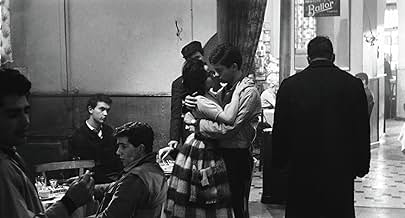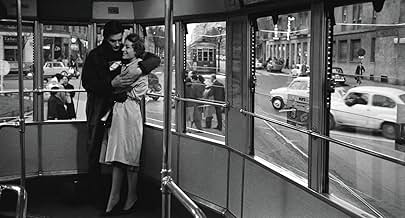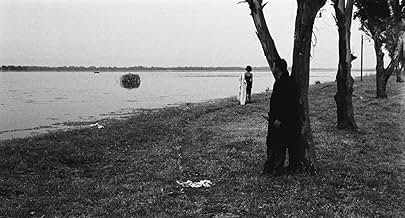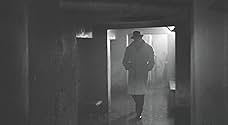Kürzlich hinauf in den Norden nach Mailand umgezogen, suchen Rocco und seine vier Brüder jeder für sich nach einem neuen Lebensweg, als eine Prostituierte auftaucht und sich zwischen Rocco u... Alles lesenKürzlich hinauf in den Norden nach Mailand umgezogen, suchen Rocco und seine vier Brüder jeder für sich nach einem neuen Lebensweg, als eine Prostituierte auftaucht und sich zwischen Rocco und seinen Bruder Simone stellt.Kürzlich hinauf in den Norden nach Mailand umgezogen, suchen Rocco und seine vier Brüder jeder für sich nach einem neuen Lebensweg, als eine Prostituierte auftaucht und sich zwischen Rocco und seinen Bruder Simone stellt.
- Nominiert für 2 BAFTA Awards
- 12 Gewinne & 10 Nominierungen insgesamt
- Vincenzo Parondi
- (as Spiros Focas)
Empfohlene Bewertungen
The most important thing that drew my attention in ROCCO E I SUOI FRATELLI was the wide range of life situations, themes and feelings which one can enumerate endlessly. The viewer is truly given an insight into profound development of charming affection, bitter humiliation, outrageous mockery, sweet desire, wretched rivalry, Utopian idealism, cruel vengeance, sad disappointment, intense sorrow, indefatigable disillusion, upsetting despair directing themselves towards final hope. By analyzing the content and trying to identify with the characters (note that it is not "observing" the characters but "identifying" with them like in classic Greek tragedies), the viewers dive into life situations which, at the same time, can be present in their own experiences: family ties, unemployment, social status, honor, social pressure, plotting, crimes...are they not all up to date now as they were in 1960? But this aspect cannot be separated from the characters.
CHARACTER ANALYSIS. Rocco (Alain Delon) is an idealist, a very good person but too noble to succeed in this world. He appears to be a sort of biblical king David whose pardoning and love lead him to omit the teaching example and forget those who really care for him. His brother Ciro (Max Cartier), however, is a good realist who knows what the family means, how it matters; yet, who does not ignore the purifying punishment for wickedness. He seems to be as good hearted as Rocco; however; his mind is indeed more "earthly." He heads for goodness filled with honest intentions but keeping both feet firmly on the ground. Vincenzo is most individual and, thanks to getting married, most separated from the family. The "villain" brother is Simone (Renato Salvatori) who becomes a successful boxer but gradually turns to declining psychological strength poisoned by desire, jealousy and vengeance. In between comes a poor mother Rosaria Parondi (Katina Paxinou) who copes with true psychological suffering of lost hope and humiliation. An interesting character is a "fallen woman" Nadia (Annie Girardot) who is as changeable and as romantic as a classical tragic female in her dreams but down to earth and desperate in her acts. When it seems possible for her to fulfill the dreams of a better life, it is too late...
There is so much profoundity and complexity in the movie that one could dwell in the themes for long. However, let me focus on the ARTISTIC FEATURES of the movie, too.
Visconti's movie is a very valuable cinematic work with truly stunning cinematography, perfect direction, excellent script, wonderful moments. Anyone who decides to see this film should not ignore three moments that appear to be the milestone of film's harmony. The first one is Rocco and Nadia on the top of Milanese cathedral where she opens her psyche to him and, at the same time, his reaction is like a great blow of individual reality affecting the mutual one: "We'll never meet again" The second moment is the scene when all the family except for Simone celebrate Rocco's championship in boxing. The two bells that ring: the first one being a mysterious visit, the second one being Simone's entrance leave critical thoughts and conclusions. The third is the final moment when Ciro talks to their youngest brother Luca about life, future, and errors that should never be made again. However, that is not all. There is something more that makes Visconti's film an artistic pearl, PERFORMANCES.
All cast do excellent jobs portraying their characters in a genuine way with a necessary invitation for viewers to identify. Alain Delon is unforgettable as Rocco: gentle, kind hearted, sometimes weak, sometimes very straightforward in personal decisions. The opposite counterpart appears to be Renato Salvatori who perfectly portrays Simone - so wild, so tremendously unstable, so easily led to fear, addiction and tragic despair. Another performance that deserves appreciation is Katina Paxinou's in the role of mother Rosaria: religious with a bit of superstition, so dominant over her sons, and generally so good hearted. A mention should be made of a minor role of Claudia Cardinale who plays Ginetta, Vincenzo's wife.
ROCCO E I SUOI FRATELLI is a must see, a movie that everyone should watch profoundly addressing three levels of attention: first, a sole interest in Visconti being one of Neorealist directors aside DeSica, Rossellini and others; second, the artistic side including cinematography, direction, charm, performances; third, insight into both content and characters, their realistic complexity, humanity of life. Then, these three hours of watching will not occur in vain.
Rocco and His Brothers is a jaw-dropping work, so ferociously brilliant that it takes your breath away. As a Visconti fan, I have been waiting to watch it for years. Yet, despite my eagerness, the DVD sat on top of the television for two weeks before I finally popped it in. Curiously, I had the same reaction to The Leopard, another Visconti masterwork, a couple of years ago. As I get older, I find it harder and harder to abandon myself to a work of art. Great works of art force one to give oneself over to them completely, suspend judgment, accept them unconditionally. When one is young and unformed, the process is easy; as one gets older, and the carapace of personality hardens, the process becomes more difficult. There is a good reason for this; the effort is often not worth while; one comes out of the experience diminished, drained, let down.
Rocco and His Brothers holds no such disappointment. It is a vast, capacious work, complex, generous, passionate, and intensely moving. The talent on display here defies analysis: Alain Delon is luminous as the saintly Rocco; Katina Paxinou achieves Shakespearean grandeur as the Parondi family matriarch; Giuseppe Rotunno's cinematography is starkly beautiful; and Nino Rota's music is heartbreaking. I do not want to give too much of this film away, but I must point out that, contrary to what some reviews on this site have to say, this film is not just about the corruption that big city life brings to a peasant family. Rocco may be a saint, but his all-forgiving nature drives much of the tragedy that unfolds. It is Ciro, the compassionate but just brother, and successful entrant into Milan's urban proletariat, who will lead the family into an uncertain but perhaps hopeful future.
Let me just finish by pointing out how wonderful it is to see a movie that ends with a meaningful and distinctive final shot. You don't see much of that anymore.
Cinematographer Giuseppe Rotunno (Amarcord, Regarding Henry, Il Gattopardo -> all three not comparable BTW) and the other makers of this film where not ambitious or pretentious while making this masterpiece: that would really have been besides the point they were making and unnecessary too, because the story and the pace don't need it and the cast is brilliant.
Some more references. The score was done by Nino Rota (Godfather, Amarcord, Il Gattopardo): the tune that helped making Godfather famous was already more or less completed here in 'Rocco'. The film might have been inspired by Ladri di biciclette (1948) and may in turn have been the inspiration for Raging Bull (1980), the Outsiders (Coppola, 1983) and even the Godfather, although 'Rocco' has nothing to do with neither mafia nor with America. In 1963 Delon, Cardinale (who has a very small role in 'Rocco') and Visconti would work together on Il Gattopardo. But 'Rocco' has to be Visconti's greatest! (besides Morte a Venezia, which is a TOTALLY different film BTW). Also see Hotel New Hampshire (1984).
10 points out of 10 :-)
"Rocco e sui fratelli" from 1960 is about a rural family (Katina Paxinou as Rosaria, Alain Delon as Rocco, Renato Salvatori as Simone, Spiros Focás as Vincenzo, Max Cartier as Ciro and Rocco Vidolazzi as Luca) who move from southern Italy to Milano, hoping to make a better life for themselves.
The brothers are all different, and therein lies the story, with the focus particularly on Rocco (Delon), a gentle soul who cares about his family and his family's honor, and Simone (Salvatori), a man with an addictive personality who only cares about himself.
Both Rocco and Simone fall for the same woman, a hooker (Anne Girardot) and come to blows - physically, since both Simone and Rocco train as boxers.
This isn't always an easy film to watch as it contains violence, rape, and murder. It also is extremely melodramatic by today's standards, with Paxinou's strong performance as the mother perhaps being viewed today as over the top. Acting styles have changed.
It's also a rather misogynistic film - well, it is Italy, it is another time period, and I'm not one who believes in cancel culture. It is also overly long - I saw the cut version, I believe, 168 minutes. I think certain scenes were cut due to censorship.
Though the film is in black and white, the look of Italy is amazing and expansive, as is the acting, particularly from Delon and Salvatori as they come up against one another in a biblical story. Claudia Cardinale pre-nosejob has a small role.
Delon, of course, is gorgeous. Hard to believe he'll be 85 this year.
Alain Delon's Top 10 Films, Ranked
Alain Delon's Top 10 Films, Ranked
Wusstest du schon
- WissenswertesFrancis Ford Coppola was such a big fan of this film that he hired its composer, Nino Rota, to score his 1972 masterwork, Der Pate (1972).
- Zitate
Ciro Parondi: Brothers or not, we're seeds taken from the same sack meant to bear fruit. A seed gone bad must be weeded out. Just like when we cleaned lentils.
- Alternative VersionenOriginally released at 180 minutes in Italy. Local censorship forced director Visconti to cut a few sequences (including scenes from Nadia's rape); the film was subsequently shortened even more for foreign distribution. Director of photography Giuseppe Rotunno has prepared a restored full version, which has been re-released in 1991.
- VerbindungenFeatured in Sunday Night: Man of Three Worlds: Luchino Visconti (1966)
Top-Auswahl
- How long is Rocco and His Brothers?Powered by Alexa
Details
Box Office
- Weltweiter Bruttoertrag
- 22.013 $
- Laufzeit
- 2 Std. 59 Min.(179 min)
- Farbe
- Sound-Mix
- Seitenverhältnis
- 1.85 : 1

![Trailer [OV] ansehen](https://m.media-amazon.com/images/M/MV5BNmE0NzFhNTAtOWYzMi00NTNkLWIwZTEtMTVlZjBkOTc1YWEzXkEyXkFqcGdeQXRyYW5zY29kZS13b3JrZmxvdw@@._V1_QL75_UX500_CR0)




















